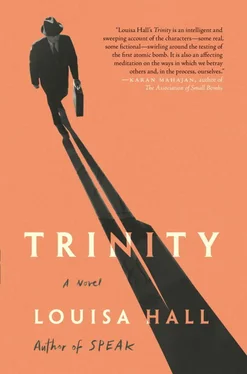IT MUST HAVE BEEN A STRANGE WOOD WE’D WANDERED INTO, BECAUSEwhen I learned I was pregnant, I wasn’t afraid.
It was as if I’d stepped into the body of some other woman, a woman without my anxieties about work and surviving and losing my right to a separate existence. Though the idea of becoming a mother had always frightened me, and was, in fact, one of the reasons for my early divorce, when I learned I was pregnant, I felt strangely serene. And when I told my husband, he was delighted. He started building a crib that afternoon. By evening, the floor of his studio was covered in sweet curls of wood.
That night, in bed, we laughed about the names we’d give our daughter, or the names we’d give to our son. So we forged deeper into the forest. He led the way, and I let myself follow, both of us children in the fairy tale he was telling, a fairy tale that only made sense in that forest.
The fast pace of the story, its strange devotions, the sweet curls of wood and the distant, meaningless sounds filtering up from the street: all of that would have alarmed me if I was still living in the old city, where I was a journalist who arranged the facts of people’s lives in meaningful order.
But in my new life, I allowed the story he was telling to move me. We were married only three months after we started sleeping together, and it was just the two of us there, alone at the courthouse, him in his boots and his absurd silver belt, me in a bright yellow shift dress we’d bought on a whim when we passed it in a window the previous evening.
I’d tried it on in the dressing room while he watched. He approved, and I wore it the next day at our wedding, and several weeks after that, he accepted a job in the Fine Arts Department at the University of Texas, a decision that surprised me, because he’d told me he didn’t like teaching.
But he’d enjoyed his visit there. And he liked the idea of moving to Texas, and raising a child in a house with a yard and trees for the child to climb in.
Once he’d proposed the idea, I found I liked it as well. I’d be able to write there, I thought, better than I could in the din of a city.
And in a new place, where we lived alone, we could be closer. We could raise our child together.
THAT SPRING, WHILE WE WAITED TO MOVE, I FELT MYSELF SINKINGinto an interesting new kind of aloneness. I drifted farther away from my friends and colleagues.
I began to cancel the dinners I’d formerly scheduled, and I avoided the work events I’d always attended, and the meetings for causes I’d once been involved in.
I even read the newspaper less. I began disengaging from the external world, and once I’d started cutting those ties, it seemed to me I could finally focus on what was really important.
My eyesight seemed to be improving. When I looked out the window of his apartment that March, I saw the dusting of chartreuse on the gray branches, and then the little forked tongues of the new leaves on the maple trees lining his street. In April, the cherry trees were in bloom, and after a windy afternoon, the gutters ran pink with their petals. By the end of the month, the maple leaves had grown so they were no longer chartreuse but silvery green, rising up from their stems like partially opened umbrellas.
When my husband went out for drinks with his friends, I waited for him to come home, sitting in the quiet of his apartment. I sat still, not daring to move, my vision sharpened so I saw each shadow on the underside of each bobbing leaf, each serrated edge, and all night I could think or feel nothing but warm anticipation in the pit of my stomach that began to spread out through my body when I heard the tread of his feet ascending the staircase.
WE MOVED TO TEXAS THAT SUMMER, AND IT WAS TRUE THAT IN THEquiet of our new home, I was more able to focus on my husband’s nature.
I didn’t have any friends or colleagues to distract me. When we first arrived, a group of wives in the Fine Arts Department invited me out to have lunch, but that was my last invitation.
Maybe, as some people do, they found me somewhat distant or cold. Perhaps they hadn’t realized in advance that I would appear foreign, a fact that surprised me as well.
In New York, I often forgot I was the daughter of an immigrant, my mother having come to America from Japan several years before the war to perform a series of concerts, and having stayed when she met and married my father.
On the East Coast, I often forgot that my face was marked by her features. In Austin, however, I felt a certain strangeness about me. It’s possible that it was only because I was from the East Coast. Or perhaps it was because of my mother, though she only ever spoke English with us, and never told us any details about the family she’d left in Japan.
In Austin, though I didn’t share my mother’s tongue, I also didn’t feel fully native, as my father—who came from an old Southern family, so that he always seemed to feel entirely at home in the pillared white house where he raised us—would have felt in a new American city.
Sometimes, in Austin, I felt I’d come to exist somewhere unclaimed between my two parents. My mother had died when I was in college. My father hadn’t approved of my divorce, so by the time I went to Austin, we rarely spoke.
A distance, in other words, was widening between myself as I had been on the East Coast—the daughter of my two parents—and myself as I was in Austin. Relocated, I sometimes had the vague sense that I’d lost all guarantees of my existence, and I wondered if my mother had felt the same way, though clearly she would have felt it much more intensely, when, during the war, her Japanese passport was declared no longer valid.
At that point, though she was already married, her American passport hadn’t come through yet, so for a short window of time, which happened to be the precise window when Japanese citizens on the West Coast were being removed to those camps, there was no place where my mother could claim the rights of citizenship, no place for her to return in the event of a disaster.
There were no available authorities, in other words, for her to appeal to. And I often considered that unsheltered state when I was first living in Austin. In Austin, as the weeks of my pregnancy passed, instead of feeling heavier, I sometimes felt as if I were floating.
I had always been quiet, but I grew even more so, which probably contributed to people’s assumption that I was either foreign or snobbish. More and more, I kept to myself, when I wasn’t spending time with my husband.
THE ISOLATION DIDN’T PERTURB ME. I LIKED OUR NEW HOUSE. THEfront yard was surrounded by a high fence, and we had a porch that faced the back alley, shaded by the leaves of an overgrown loquat.
Sitting in the porch swing, swatting mosquitoes, I read or worked on various projects. Though I’d agreed with my editor that he should send me assignments in Texas, I began to find such assignments annoying.
If they required me to fly to other places, I found reasons for turning them down. And sometime that summer, I realized with a flicker of concern that I found writing less pleasurable than I once had. Or perhaps I should say that the thrill I had once felt in understanding the lives of my subjects now seemed childish when compared to the pleasure with which I studied my husband.
The way I’d written before seemed to me very similar to a girl playing with dolls, pushing people around and asserting her will over their lives, temporarily escaping her own life in order to insert herself into somebody else’s.
The work I did now with my husband—trying to remain very still while he came toward me and touched me—felt like something else entirely. Trying to keep my beating heart calm, I watched him when he came in from the car. I watched the way he started to smile, and, if I stayed very still, in my own throat I felt his desire.
Читать дальше












